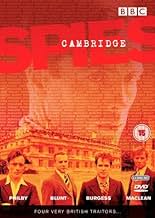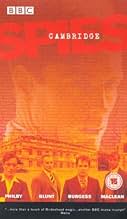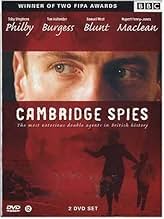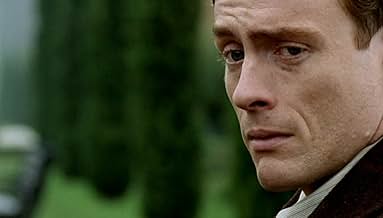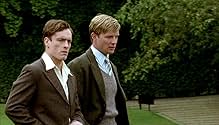Cambridge Spies
- Mini serie TV
- 2003
- 59min
VALUTAZIONE IMDb
7,4/10
2365
LA TUA VALUTAZIONE
Aggiungi una trama nella tua linguaThe true story of a group of Cambridge University Students who are recruited to spy for the Soviet Union in the early 1930s.The true story of a group of Cambridge University Students who are recruited to spy for the Soviet Union in the early 1930s.The true story of a group of Cambridge University Students who are recruited to spy for the Soviet Union in the early 1930s.
- Nominato ai 4 BAFTA Award
- 3 vittorie e 5 candidature totali
Sfoglia gli episodi
Recensioni in evidenza
This is a lightly fictionalised account of how four tewwibly well brought up English boys betrayed their country to the Soviet Union. Philby's father had been a distinguished diplomat and Arabist and McLean's a cabinet minister. All had public school educations and had been undergraduates at the same Cambridge college. They set off into promising careers in the foreign office and security services and were Soviet agents from the start. Their great coup was to give the Soviets enough details about the atomic bomb to speed up their program to build one by a couple of years, but it was at the expense of blowing McLean and Burgess's cover (they escaped to Moscow in 1951), and Philby being fired from MI6. He joined them in Moscow in 1963. Blunt, by now the Keeper of the Queen's Pictures was then interrogated; he confessed, and was let go.
It's one of the really great spy stories of the 20th century. This version concentrates on the personal dynamics. The amount of contact the spies had with each other after Cambridge seems to be much exaggerated (pretty bad security), but gives us the picture of the gang of four against the Establishment. The women are interesting too. Philby was a ladies' man to whom Donald McLean's American wife Melinda (Anne-Louise Plowman) was attracted. They later lived together in Moscow. Blunt and Burgess were both gay, but friends rather than lovers.
The Establishment, in the person of Lord Halifax (James Fox), Ambassador to Washington, found it difficult to believe that 'people like us' could do such things and started looking for the atomic spy in the embassy kitchens. One or two western counter-intelligence operatives including the CIA's formidable James Jesus Angleton nearly nabbed them, but with Philby tipping them off (and duchessing Angleton), Burgess and McLean made it safely to Moscow.
With four hours to play with all the characters are richly drawn. Tom Hollander's Guy Burgess is a drunken dirty little sod who somehow manages to be witty and charming as well. It was great cover for a spy. As Donald McLean, Rupert Penry-Jones is the Golden Boy who feels himself unworthy, and sees communism as the way to redemption. Toby Stephens as Kim Philby gives us the cleverness, the deviousness and the angst as well, especially in the Spanish episode.(I'm afraid us Philbys are a devious lot, but we bleed, we bleed). Samuel West's Blunt has the occasional hint of emotion, but basically is a cold fish. Art, it seems is his life. He does get on tewwibly well with the Queen.
Seventy years on, it's not so much why they did it, but why they kept it up that mystifies. Given their location close to the heart of British Intelligence and hence knowing as much as anybody outside about what really went on the Soviet Union, it's extraordinary that Philby and McLean in particular continued on right up to 1951 (Blunt was more or less inactive after 1945). It is suggested here that Ms McLean did try to get her husband to give up spying but there's no real explanation as to why he persisted. Perhaps he still believed. Anyway, truth or fiction is hardly the point here - Sunday night is not for history lessons. This is a familiar tale well told, visually splendid and not too taxing. The real story, I suspect, is far too complex for even the most adroit (or left) TV producer. An earlier TV account,"Philby Burgess and McLean" (1977) is also worth watching, if you can find it.
It's one of the really great spy stories of the 20th century. This version concentrates on the personal dynamics. The amount of contact the spies had with each other after Cambridge seems to be much exaggerated (pretty bad security), but gives us the picture of the gang of four against the Establishment. The women are interesting too. Philby was a ladies' man to whom Donald McLean's American wife Melinda (Anne-Louise Plowman) was attracted. They later lived together in Moscow. Blunt and Burgess were both gay, but friends rather than lovers.
The Establishment, in the person of Lord Halifax (James Fox), Ambassador to Washington, found it difficult to believe that 'people like us' could do such things and started looking for the atomic spy in the embassy kitchens. One or two western counter-intelligence operatives including the CIA's formidable James Jesus Angleton nearly nabbed them, but with Philby tipping them off (and duchessing Angleton), Burgess and McLean made it safely to Moscow.
With four hours to play with all the characters are richly drawn. Tom Hollander's Guy Burgess is a drunken dirty little sod who somehow manages to be witty and charming as well. It was great cover for a spy. As Donald McLean, Rupert Penry-Jones is the Golden Boy who feels himself unworthy, and sees communism as the way to redemption. Toby Stephens as Kim Philby gives us the cleverness, the deviousness and the angst as well, especially in the Spanish episode.(I'm afraid us Philbys are a devious lot, but we bleed, we bleed). Samuel West's Blunt has the occasional hint of emotion, but basically is a cold fish. Art, it seems is his life. He does get on tewwibly well with the Queen.
Seventy years on, it's not so much why they did it, but why they kept it up that mystifies. Given their location close to the heart of British Intelligence and hence knowing as much as anybody outside about what really went on the Soviet Union, it's extraordinary that Philby and McLean in particular continued on right up to 1951 (Blunt was more or less inactive after 1945). It is suggested here that Ms McLean did try to get her husband to give up spying but there's no real explanation as to why he persisted. Perhaps he still believed. Anyway, truth or fiction is hardly the point here - Sunday night is not for history lessons. This is a familiar tale well told, visually splendid and not too taxing. The real story, I suspect, is far too complex for even the most adroit (or left) TV producer. An earlier TV account,"Philby Burgess and McLean" (1977) is also worth watching, if you can find it.
High production values and a great story drive this excellent show along at just the right pace. Never rushed or drawn-out. A few oddities with the script - some things don't seem to flow right but minor. Perhaps the editor put a few bits of film in the wrong place! David Higgs' photography is a joy to watch - it would almost be worth watching without any sound! Aspiring DPs (directors of photography)should look at his lighting, framing and camera movement. Lovely use of long lenses to separate the characters from the background. Older DPs should start to worry!
I had heard and read about Kim Philby, of course, but not of the other ones, plus I was not aware of their past and story of formation. Realistic atmosphere, motives well explained and logical, vices and virtues of the protagonists, etc. - everything depicted in a skilful manner. And, of course, the performances, particularly Tom Hollander as Guy Burgess, but also the others - convincing, stylish, but also showing dangers of "elite" and closed communities where depravities are so easy to emerge and develop.
In retrospect, one may ponder on and over how the British authorities were so naive, but, on the other hand, it was an era without much technology and funding to deal with "the own"...
In retrospect, one may ponder on and over how the British authorities were so naive, but, on the other hand, it was an era without much technology and funding to deal with "the own"...
Since no one has said so yet, it seems necessary to add this.
The series is an excellent drama, in every way - no doubt about that. Well worth watching.
BUT.
And that is the point: The subject of this drama is politics, international affairs, government, intelligence - and these are largely absent from the drama.
So if you are prepared to enjoy a view of the events from the perspective of the personal lives of the main characters, then all is fine. But if you were looking for more than tenuous references to the events and forces at play in the world, and an account of how the characters of the story were involved in those events and forces, you will miss something...
This is not to say that it's a bad drama - it's still excellent. And lavishly designed and produced.
But those political events and forces were of historic importance. At a time where the world was still strongly driven by ideological currents, and there was a ruthless struggle for world domination.
In my view, that is even higher drama, and I missed those connections.
The series is an excellent drama, in every way - no doubt about that. Well worth watching.
BUT.
And that is the point: The subject of this drama is politics, international affairs, government, intelligence - and these are largely absent from the drama.
So if you are prepared to enjoy a view of the events from the perspective of the personal lives of the main characters, then all is fine. But if you were looking for more than tenuous references to the events and forces at play in the world, and an account of how the characters of the story were involved in those events and forces, you will miss something...
This is not to say that it's a bad drama - it's still excellent. And lavishly designed and produced.
But those political events and forces were of historic importance. At a time where the world was still strongly driven by ideological currents, and there was a ruthless struggle for world domination.
In my view, that is even higher drama, and I missed those connections.
A very highly fictionalised account - but why did it need to be? The story of the Cambridge Five really did deserve better than this.
As drama it can't be faulted, but as a depiction of historical events it left much to be desired. We British are prone to look down upon the American TV movie, and for all the same reasons that were evident in the Cambridge Spies.
The story of the Five is well known enough for me not to have to point out the inaccuracies involved in this production, but beyond that I had no real sense of time and place, and certainly no sense of the evil these men did and the horrors and tragedies that came about as a result of their activities. In four hours there was room enough to get it right.
Some events were tick-boxed in glib exchanges, others rendered risible - the horror of Guernica reduced to one aged aeroplane with German markings, a mother, her son, the rattle of gunfire, the inevitable priest who rushes to the aid of the dead boy.
Philby lost his stammer, MacLean's bisexuality was never hinted at, Burgess became almost a paragon of virtue compared with the reality of the man, and Blunt...
The appeal of this series was, whatever the BBC might say, that it was based around real events. In that case I feel the viewer has a right to expect factual accuracy, otherwise the fictionalisation may as well have extended to the substitution of fictional names for the characters, and the excising of the "what happened next" text before the end-credits.
As BBC drama this was well up to standard, as BBC factual drama it took a long step in the wrong direction.
As drama it can't be faulted, but as a depiction of historical events it left much to be desired. We British are prone to look down upon the American TV movie, and for all the same reasons that were evident in the Cambridge Spies.
The story of the Five is well known enough for me not to have to point out the inaccuracies involved in this production, but beyond that I had no real sense of time and place, and certainly no sense of the evil these men did and the horrors and tragedies that came about as a result of their activities. In four hours there was room enough to get it right.
Some events were tick-boxed in glib exchanges, others rendered risible - the horror of Guernica reduced to one aged aeroplane with German markings, a mother, her son, the rattle of gunfire, the inevitable priest who rushes to the aid of the dead boy.
Philby lost his stammer, MacLean's bisexuality was never hinted at, Burgess became almost a paragon of virtue compared with the reality of the man, and Blunt...
The appeal of this series was, whatever the BBC might say, that it was based around real events. In that case I feel the viewer has a right to expect factual accuracy, otherwise the fictionalisation may as well have extended to the substitution of fictional names for the characters, and the excising of the "what happened next" text before the end-credits.
As BBC drama this was well up to standard, as BBC factual drama it took a long step in the wrong direction.
Lo sapevi?
- QuizBased on the same real life events as Another Country - La scelta (1984), History in Faces: Cambridge Five (2011), Philby, Burgess e Maclean (1977), A Question of Attribution (1991), An Englishman Abroad (1983), La talpa (2011), La talpa (1979), Blunt (1987), Traitor (1971), Blade on the Feather (1980), Triplo gioco (1983) and influenced the source novels of Quarto protocollo (1987), The Innocent (1993) and others works such as Codice Homer: A Different Loyalty (2004) and Olding (2019), even in minor form like in The Imitation Game (2014).
- BlooperGuy Burgess is in a London flat eating Van Camps baked beans from a can. This brand is not available in England.
- Citazioni
Guy Burgess: Vladivostok, Moscow, the Kusnetsk Basin, Cambridge - the coldest places on Earth. Of the four, Cambridge is the coldest, permanently February the nineteenth.
- ConnessioniVersion of Philby, Burgess e Maclean (1977)
- Colonne sonoreJerusalem
by Hubert Parry
I più visti
Accedi per valutare e creare un elenco di titoli salvati per ottenere consigli personalizzati
Dettagli
- Data di uscita
- Paese di origine
- Sito ufficiale
- Lingua
- Celebre anche come
- Espías de Cambridge
- Luoghi delle riprese
- Aziende produttrici
- Vedi altri crediti dell’azienda su IMDbPro
Contribuisci a questa pagina
Suggerisci una modifica o aggiungi i contenuti mancanti

Divario superiore
By what name was Cambridge Spies (2003) officially released in India in English?
Rispondi
